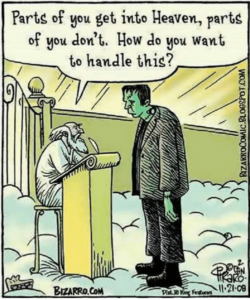We ‘get into’ Heaven faster…when we work to create Heaven on earth
In the 1960’s, at the Church Council of Vatican II, the teaching on Baptism was made more understandable by including the additional condition:
Baptism by Desire: those seeking God with a sincere heart and a desire to do good.
I believe we can also include the desire of those responsible for other people:
we think of mums/dads whose little child dies before being baptised.
we think of mums/dads with troubled teenagers who die while struggling with life.
The First Reading gives us a wonderful sense of inclusion: “if foreigners (non-Jewish), are trying to behave well towards others, then they will not be excluded from Heaven.”
 God’s desire is for all of us to “come home”, but we have to work hard. Why? Because no one wants to live in a home where there is no unity = a common way of living!
God’s desire is for all of us to “come home”, but we have to work hard. Why? Because no one wants to live in a home where there is no unity = a common way of living!
G. K. Chesterton said: “The Christian ideal has not been tried and found wanting. It has been found difficult, and left untried.” Ghandi said: “I like your Christ, I do not like your Christians. Your Christians are so unlike your Christ,” and “I would be a Christian if I could find one.”
Today is a wake-up call to each one of us. Perhaps as Christians we think we already have a ticket to Heaven. In one sense it’s true: we do! The question is, will we like Heaven when we get there? Will we look inside and say: what’s that man doing here? I don’t like him!
Long ago the Jewish tradition held that they were the chosen ones, & others would be excluded. So, in the Gospel, Jesus includes the woman and her daughter in salvation.
The dialogue is a way for Jesus to teach the Jewish people around him: it and should not be taken as being disrespectful to the “foreign” woman.
 In the second reading, St Paul is very explicit and challenging, to the good people of this world, by saying that: “even those who are disobedient now, will receive mercy later.” St Paul uses an interesting phrase to describe the disobedient people: they are imprisoned.
In the second reading, St Paul is very explicit and challenging, to the good people of this world, by saying that: “even those who are disobedient now, will receive mercy later.” St Paul uses an interesting phrase to describe the disobedient people: they are imprisoned.
Do you feel pity for people who are full of anger and resentment because of the past? Their inability to forgive “imprisons” them, and prevents them from enjoying the present. Or people who live in constant fear about the future, and never live joyfully in the present?
Did not the Israelites “imprison” themselves for 40 years in the desert struggling to learn how to behave? They could have reached the Promised Land a lot sooner if they had changed faster!
So, these examples teach us that although Heaven is a place for everyone, it’s partly up to us to decide if we want to go into Heaven. Heaven is not a place where we decide how it runs. That’s a bit of a challenge for many people these days!!
Our cultures encourage us to be in control: follow your own dreams and do what you like! However, Heaven is a place where we submit ourselves to living the way God wants us to live.
It’s always sad when divided families come to a funeral and sit on opposite sides of the church. God is always working to bring us back together – and cooperating with God is the best way for us to find long-lasting peace in our lives.
The role of the Church and us, as members of the Church, is this: to help people live the teachings of Christ as best they can in their present reality. It’s not helpful to hit people over the head with the Bible or the Catechism. As Ghandi and Chesterton were trying to express, let’s live by example: allow our happiness & joy to encourage others see that the Good News is worth following.
Every act of kindness to another is an example of creating Heaven here and including them in Heaven. The important thing in life is not to be perfect: but to keep trying; to say sorry when we fail; to help others; to encourage others and to laugh often!
Then we have nothing to fear from God.
Let’s pray that God can help us persevere in trying to do the right thing, and give us the necessary wisdom to be gentle with ourselves and others.
By Gerard Conlan, OMI


